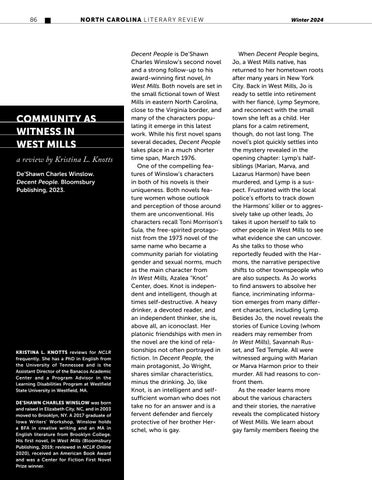86
NORTH CAROLINA L I T E R A R Y RE V I E W
COMMUNITY AS WITNESS IN WEST MILLS a review by Kristina L. Knotts De’Shawn Charles Winslow. Decent People. Bloomsbury Publishing, 2023.
KRISTINA L. KNOTTS reviews for NCLR frequently. She has a PhD in English from the University of Tennessee and is the Assistant Director of the Banacos Academic Center and a Program Advisor in the Learning Disabilities Program at Westfield State University in Westfield, MA. DE’SHAWN CHARLES WINSLOW was born and raised in Elizabeth City, NC, and in 2003 moved to Brooklyn, NY. A 2017 graduate of Iowa Writers’ Workshop, Winslow holds a BFA in creative writing and an MA in English literature from Brooklyn College. His first novel, In West Mills (Bloomsbury Publishing, 2019; reviewed in NCLR Online 2020), received an American Book Award and was a Center for Fiction First Novel Prize winner.
Decent People is De’Shawn Charles Winslow’s second novel and a strong follow-up to his award-winning first novel, In West Mills. Both novels are set in the small fictional town of West Mills in eastern North Carolina, close to the Virginia border, and many of the characters populating it emerge in this latest work. While his first novel spans several decades, Decent People takes place in a much shorter time span, March 1976. One of the compelling features of Winslow’s characters in both of his novels is their uniqueness. Both novels feature women whose outlook and perception of those around them are unconventional. His characters recall Toni Morrison’s Sula, the free-spirited protagonist from the 1973 novel of the same name who became a community pariah for violating gender and sexual norms, much as the main character from In West Mills, Azalea “Knot” Center, does. Knot is independent and intelligent, though at times self-destructive. A heavy drinker, a devoted reader, and an independent thinker, she is, above all, an iconoclast. Her platonic friendships with men in the novel are the kind of relationships not often portrayed in fiction. In Decent People, the main protagonist, Jo Wright, shares similar characteristics, minus the drinking. Jo, like Knot, is an intelligent and selfsufficient woman who does not take no for an answer and is a fervent defender and fiercely protective of her brother Herschel, who is gay.
Winter 2024
When Decent People begins, Jo, a West Mills native, has returned to her hometown roots after many years in New York City. Back in West Mills, Jo is ready to settle into retirement with her fiancé, Lymp Seymore, and reconnect with the small town she left as a child. Her plans for a calm retirement, though, do not last long. The novel’s plot quickly settles into the mystery revealed in the opening chapter: Lymp’s halfsiblings (Marian, Marva, and Lazarus Harmon) have been murdered, and Lymp is a suspect. Frustrated with the local police’s efforts to track down the Harmons’ killer or to aggressively take up other leads, Jo takes it upon herself to talk to other people in West Mills to see what evidence she can uncover. As she talks to those who reportedly feuded with the Harmons, the narrative perspective shifts to other townspeople who are also suspects. As Jo works to find answers to absolve her fiance, incriminating information emerges from many different characters, including Lymp. Besides Jo, the novel reveals the stories of Eunice Loving (whom readers may remember from In West Mills), Savannah Russet, and Ted Temple. All were witnessed arguing with Marian or Marva Harmon prior to their murder. All had reasons to confront them. As the reader learns more about the various characters and their stories, the narrative reveals the complicated history of West Mills. We learn about gay family members fleeing the
